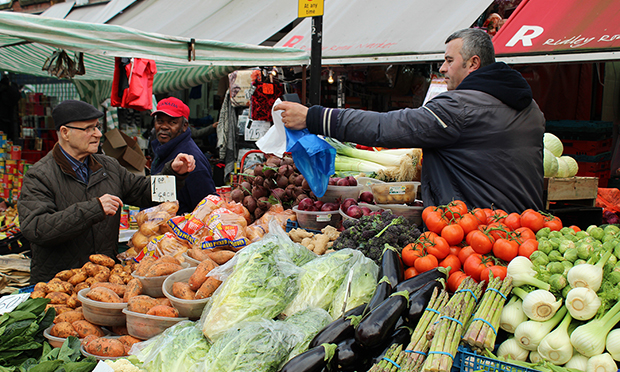Hackney’s market traders given rent relief during recent winter food shortage after council’s ‘nimble reaction’

Ridley Road Market in Dalston
Market traders received rent relief as they struggled to source hard-to-find food during a recent shortage.
They were handed a 25 per cent discount when there was a scarcity of staples such as tomatoes and cucumbers last winter.
The move came as the country was hit by shortages in food – blamed on poor weather in Spain and increasing fuel costs – as well as a hike in seed and fertilizer prices.
Daniel O’Sullivan, service manager for street trading, said: “The prices of wholesale was significantly higher and it’s something that we monitor.
“We immediately implemented a 25 per cent rent relief on their daily licence and fees to support them in continuing to be able to purchase that product and keep their profit margin, but more importantly made sure there was higher quality, low-cost fruit and vegetables available in all of our street markets and trading sites.”
He said this meant shoppers had an option when they could not find certain foods in local supermarkets or chains.
“It’s the ability to react and be nimble, making these type of decisions at pace that puts us ahead of competitors, whether these be other markets or whether they are other bricks-and-mortar premises.”
Hackney was the only borough to run a six-day-a-week market for essentials during the Covid lockdowns, when rules allowed.
Market bosses said Ridley Road in Dalston had just a third of traders, and customer numbers dropped from 2.1 million pre- pandemic to 236,132 in 2020/21. Nearly half were shopping two to four times a week and spending £10 a time.
Normally, Ridley Road accounts for 70 per cent of all takings in Dalston.
The market team said that, post-pandemic, Hackney’s markets have seen a stronger recovery than others in London.
They told Hackney’s skills, economy and growth scrutiny committee that some shoppers are using supermarkets less and markets more, as they shop around for bargains.
Kevin Keady, the council’s head of markets and parking, said because of high inflation, customers are choosing not to go to the supermarket anymore.
“It’s driving footfall into the markets because of the perception thst you’re going to get more for your pound.
“More and more people are coming to markets now, looking for better value for money.”
